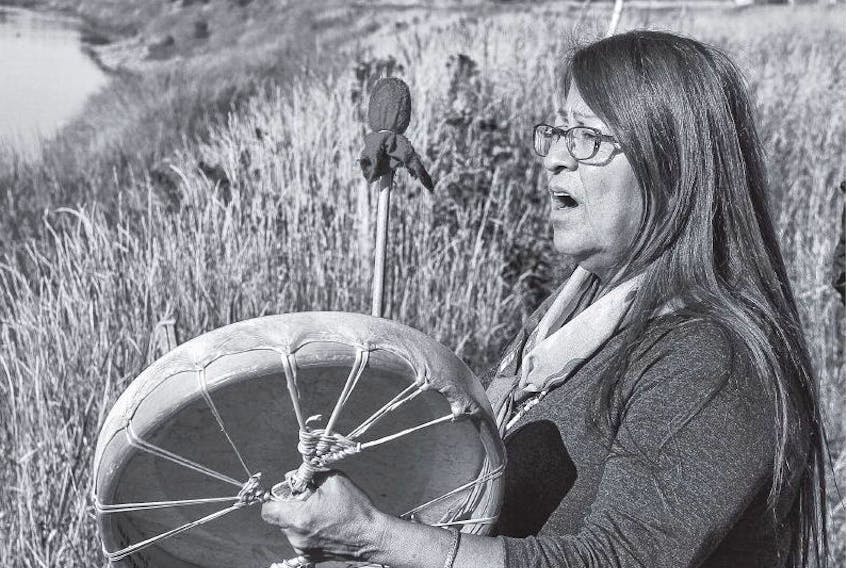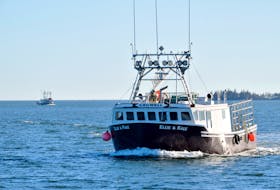The resistance team standing on guard at the gate to the Alton gas project is not backing down.
“We are not leaving,” said Dorene Bernard, a Sipekne’katik Band elder who lives in Indian Brook.
“We are protecting the water no matter what.”
On Monday, a collective resistance team of First Nations, local residents and their supporters who have spent nearly three years camping out by the Shubenacadie River estuary in Fort Ellis, Colchester County, put out a news release that said the company, Alton Natural Gas Storage LP, was employing aggressive tactics at the site.
The group opposes the project, which would take millions and millions of litres of water from the river system and pipe it 12 kilometres to a Brentwood Road location, where it would be pumped underground to flush out salt beds to create gigantic natural gas storage caverns. The resulting brine would be pumped back and discharged into the river, directly onto the native fishing grounds in a move the Mi’kmaq say is an infringement on their treaty rights.
The $130-million project has been dormant for almost the entirety of 2017, but Bernard, among the dozen or so resistance team members that camps out in shifts by the project gate, said company community liaison Rob Turner returned to the site recently.
“We still not have had procedural fairness on the EA (environmental assessment) that was appealed this time last year,” Bernard said. “Our band, our people are still waiting for consultation within the community.”
The band had appealed the Environment Department’s 2016 environmental approval of the project’s brining operation. When the department denied the appeal, the band took it to Nova Scotia Supreme Court and won a decision last January. The band’s appeal was sent back to the minister to deal with and the department was ordered to further consult with the band.
An Environment Department spokeswoman said Monday there is no update on the project and the court decision.
“The minister continues to review the submission and we understand that the band and Alton Gas are in discussions,” she said.
Not so, said Bernard, who added that the resistance group has noticed an increased police presence around the remote location.
“Police are at the location when they are responding to calls on any complaints we receive,” said Const. Dal Hutchinson of the RCMP. “ In addition, our members are routinely on site in a liaison role to support lawful demonstrations.”
He said there have been no incidents as of late that resulted in increased police presence.
A company spokeswoman said the company has been respectful of the protesters’ presence at the river site.
“Certainly, the view is that people have the right to express their opinions but in a safe and peaceful manner,” Lori MacLean said. “The river site itself is open only to Alton staff and approved contractors. The straw bale site that sits there was built at the site without the company’s permission and we’re continuing to work with local law enforcers regarding the protesters and activity at the site.”
MacLean said the plan is to begin the brining process this year and she said the company, a subsidiary of AltaGas, has engaged in substantial community and public consultations with a variety of stakeholders — landowners, community members, government and the Mi’kmaq — going back to 2006.
MacLean said the project has had two approved environmental assessments, one for the facilities and one for the pipelines.
“On top of that in the 2015 timeframe, the Assembly of Nova Scotia chiefs led a third-party independent science review of the project,” she said. “They came back with recommendations for Alton that have been fully adopted.”
To date, she said, $69 million has been invested to develop Alton and the project is an investment of more than $130 million in rural Nova Scotia. Since 2014, more than 70 Nova Scotia companies have provided goods, services and labour to Alton.
Still, consultation is lacking, Bernard said, adding that different ways to gauge community opinion, including a referendum and a plebiscite, had been suggested but have not come to fruition.
“But there has been no band council resolution, no meetings regarding this. They still don’t have the right to push through there or to do any work there until those issues are resolved.”
She said the band was provided a potential impact benefit agreement last year that was since changed to include things like a hockey rink, supplying heat and lights for elders, among other potential gifts from the company to the band.
“It got people talking but I said ‘this is crazy, we’re not voting on this.’ It was just a wish list.
“Our treaty rights and our water, our sovereignty and our fish, our ability to feed ourselves and to have this river here in its current state is more important than anything they can throw at you. In our lifetime, those things will be gone and what will be left for the next seven generations. We’ve been here for over 13,000 years and this river is fine the way it is. It’s sustained us.”









